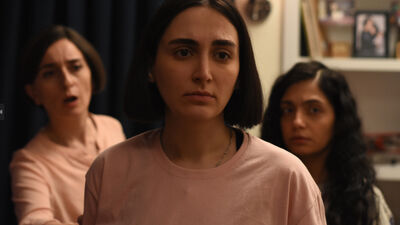Payal Kapadia was one of the most exciting names announced for this year’s competition. Her debut feature, “A Night of Knowing Nothing,” which screened in Directors’ Fortnight three years ago, was a distinctive, politically charged hybrid film that melded documentary and archival footage with a fictitious voice-over to reflect on student protests and casteism in contemporary India.
Her new film, “All We Imagine as Light,” is said to be the first Indian feature to screen in competition in 30 years. It turns out to be not another nonfiction feature but a drama about, principally, two women, Prabha (Kani Kusruti) and Anu (Divya Prabha), nurses who work at the same hospital in Mumbai and are also roommates. Prabha has a husband in Germany, but it seems that he’s forgotten her—the phone calls became less and less frequent until they stopped. Anu is in a covert, cross-faith relationship with a Muslim boyfriend (Hridhu Haroon), which is tricky for reasons of propriety and logistics.
The progression of the narrative owes a lot to Abbas Kiarostami, both in the ambiguity surrounding the gift of a German-made rice cooker that Prabha receives and in a late development—after the film has shifted locations to a coastal village—that recalls Kiarostami’s “Certified Copy.” The film is powerfully feminist in its perspective, impressively naturalistic in its storytelling, and boldly mysterious in its gentle irresolution.

Shown at the end of the competition almost as an afterthought, Michel Hazanavicius’s “The Most Precious of Cargoes” might have played perfectly as a network television holiday special, but screened in this context, it was difficult to account for. Narrated by Jean-Louis Trintignant, who died in 2022, and based on a story by Jean-Claude Grumberg, it is an animated feature about how a woodcutter and his wife secretly take in a baby girl from a train that was headed to the camps. The animation is in a deliberately simple style, and the storytelling favors a fable-ish abstraction. (The husband is initially antisemitic until he warms to the child, although there’s something perturbingly coy about the film’s refusal ever to use the word “Jewish.”) The closing voice-over, which seems aimed at reconciling the fairy tale trappings and the serious subject matter, is a muddle.
